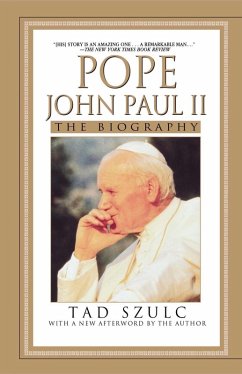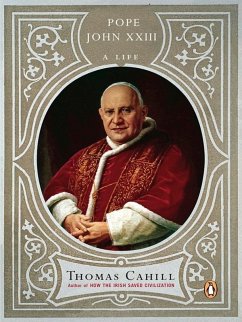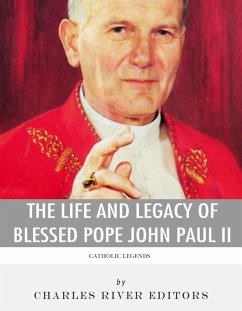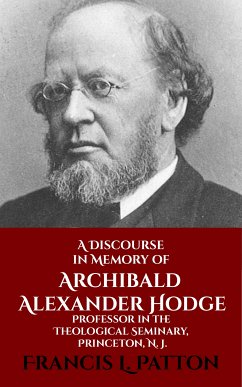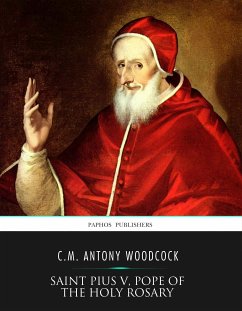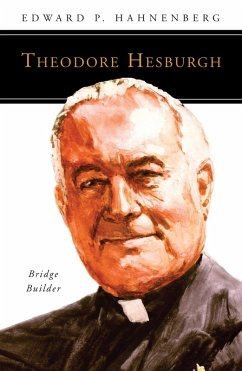
History of the Pontificate of Pope John XXIII (eBook, ePUB)

PAYBACK Punkte
0 °P sammeln!
This comprehensive exploration of the pontificate and legacy of Pope John XXIII examines his profound influence on the Catholic Church and the modern world. Known as Il Papa Buono ("The Good Pope"), John XXIII's life and leadership were characterized by humility, courage, and a commitment to dialogue and renewal. His surprising election in 1958 led to a papacy defined not by maintenance of the status quo but by bold reforms that culminated in the convening of the Second Vatican Council-a transformative event in Church history.Key elements of his leadership include his emphasis on aggiornamento...
This comprehensive exploration of the pontificate and legacy of Pope John XXIII examines his profound influence on the Catholic Church and the modern world. Known as Il Papa Buono ("The Good Pope"), John XXIII's life and leadership were characterized by humility, courage, and a commitment to dialogue and renewal. His surprising election in 1958 led to a papacy defined not by maintenance of the status quo but by bold reforms that culminated in the convening of the Second Vatican Council-a transformative event in Church history.
Key elements of his leadership include his emphasis on aggiornamento ("bringing up to date"), his pastoral approach to governance, and his dedication to ecumenism and interfaith dialogue. John XXIII's landmark encyclicals, Mater et Magistra (1961) and Pacem in Terris (1963), articulated a vision of social justice, human dignity, and global peace that resonated with Catholics and non-Catholics alike during the Cold War era. His encyclicals elevated Catholic social teaching to a universal appeal, advocating for economic fairness, human rights, and the rejection of war as a means of conflict resolution.
This study delves into the historical context of his life, including his diplomatic work during World War II, where he facilitated the rescue of Jewish refugees, and his tenure as Patriarch of Venice, which deepened his understanding of pastoral care. His personal writings, especially Journal of a Soul, reveal a man of deep spirituality, whose holiness was expressed through humility, prayer, and profound trust in divine providence.
The research also addresses the challenges he faced during the early sessions of Vatican II, such as resistance from conservative factions within the Curia, and his ability to maintain unity amid theological tensions. His vision for the Church as a "field hospital" that ministers to the wounds of humanity has inspired subsequent popes and remains relevant in contemporary Catholicism. His canonization in 2014 alongside Pope John Paul II reaffirmed his lasting impact on the Church's identity and mission.
By synthesizing historical sources, primary documents, and theological reflections, this work highlights John XXIII's enduring legacy as a bridge-builder, peacemaker, and spiritual guide. His commitment to mercy, inclusivity, and global solidarity continues to shape the Church's response to social and moral challenges, making him a saint not only for his time but for generations to come.
Key elements of his leadership include his emphasis on aggiornamento ("bringing up to date"), his pastoral approach to governance, and his dedication to ecumenism and interfaith dialogue. John XXIII's landmark encyclicals, Mater et Magistra (1961) and Pacem in Terris (1963), articulated a vision of social justice, human dignity, and global peace that resonated with Catholics and non-Catholics alike during the Cold War era. His encyclicals elevated Catholic social teaching to a universal appeal, advocating for economic fairness, human rights, and the rejection of war as a means of conflict resolution.
This study delves into the historical context of his life, including his diplomatic work during World War II, where he facilitated the rescue of Jewish refugees, and his tenure as Patriarch of Venice, which deepened his understanding of pastoral care. His personal writings, especially Journal of a Soul, reveal a man of deep spirituality, whose holiness was expressed through humility, prayer, and profound trust in divine providence.
The research also addresses the challenges he faced during the early sessions of Vatican II, such as resistance from conservative factions within the Curia, and his ability to maintain unity amid theological tensions. His vision for the Church as a "field hospital" that ministers to the wounds of humanity has inspired subsequent popes and remains relevant in contemporary Catholicism. His canonization in 2014 alongside Pope John Paul II reaffirmed his lasting impact on the Church's identity and mission.
By synthesizing historical sources, primary documents, and theological reflections, this work highlights John XXIII's enduring legacy as a bridge-builder, peacemaker, and spiritual guide. His commitment to mercy, inclusivity, and global solidarity continues to shape the Church's response to social and moral challenges, making him a saint not only for his time but for generations to come.
Dieser Download kann aus rechtlichen Gründen nur mit Rechnungsadresse in A, B, CY, CZ, D, DK, EW, E, FIN, F, GR, H, IRL, I, LT, L, LR, M, NL, PL, P, R, S, SLO, SK ausgeliefert werden.




